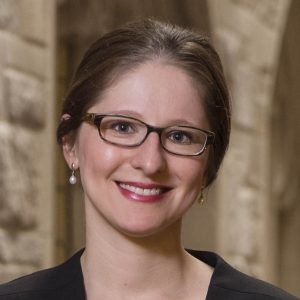Editor’s Note: In this BC Law Magazine “Vision Project” series, we are engaged in a lengthy discussion with Boston College Law School faculty about where the Covid-19 pandemic and its attendant medical, economic, racial, and political consequences may lead us. As New York Times op-ed columnist Timothy Egan so eloquently put it recently, “Every crisis opens a course to the unknown. In an eye-blink, the impossible becomes possible. History in a sprint can mean a dark, lasting turn for the worse, or a new day of enlightened public policy.” There are warnings and worries in these professors’ views, but there are also farsighted ideas and strategies for crafting a better future, a more just society, and a world in which each and every human being is equal under the law.
PROFESSOR NATALYA SHNITSER
Professor Shnitser was the inaugural David and Pamela Donohue Assistant Professor in business law. Her research focuses on retirement security in the United States, including the provision of retirement benefits by private and public employers and the regulation of financial intermediaries. She earned her JD from Yale Law School, and undergraduate and master’s degrees from Stanford University.

What has the coronavirus pandemic revealed about the strengths and weaknesses of our regulation regimes and our employee benefits laws? The coronavirus pandemic has shone a harsh light both on the extent to which retirement and health care benefits are tethered to employment, and on the limits and inequities of existing paid leave policies for US workers. As social-distancing requirements, school closures, and stay-at-home orders became necessary to limit the spread of the virus, millions of workers, particularly those employed by smaller businesses, confronted the lack of paid leave policies to stay home if they became sick or needed to take care of family members. While Congress responded with new temporary requirements for emergency paid sick leave and paid family and medical leave for businesses with fewer than 500 employees, the effectiveness of these new provisions, particularly in light of the exemptions provided in subsequent regulatory guidance, remains to be seen.
At the same time, and in the midst of a public health crisis, millions of Americans have not only lost their jobs, but also their employer-sponsored retirement benefits and health insurance. For such individuals and families, continuation coverage under COBRA, if it is available, may not be affordable, while the ability to obtain health insurance coverage provided by the Affordable Care Act varies significantly across states. The loss of jobs and of health insurance exacerbates long-standing inequality in the United States. In the wake of the pandemic, black and Hispanic workers have been especially hard hit by job losses. As of June, the unemployment rate among African Americans was 16.8 percent. The unemployment rate among Hispanics was 17.6 percent, while the unemployment rate among whites was 12.4 percent.
Finally, as millions face financial hardships in the wake of the pandemic, Congress has made it easier for Americans to take money out of their retirement savings to cover current expenses. The policy response underscores the extent to which retirement savings in the United States double as emergency savings for many individuals and families. While the immediate needs are undoubtedly dire, the Congressional response may undermine retirement security in the long run, thereby putting additional pressure on a system with numerous existing shortcomings, and further undermining the ability of US workers to maintain living standards in retirement.
What short- and long-term opportunities do you see for improving how we define and deliver economic justice? My hope is that the pandemic and the recent groundswell of protests over systemic racism serve as a catalyst for meaningful reform to address income and wealth inequality in the United States. As an employee benefits scholar, I believe it is important that such efforts encompass reforms to address disparities in income and wealth at all stages of life, including in retirement. Recent research from the Boston College Center for Retirement Research (CRR) documents the racial inequality in retirement wealth: in 2016, for example, the typical black household had 46 percent of the retirement wealth of the typical white household. According to the CRR, the typical Hispanic household had 49 percent. The pandemic is likely to exacerbate these disparities, thus making efforts to critically examine and reassess the US retirement system—including employer-sponsored retirement benefits, individual savings, and Social Security—all the more urgent.
In addition, I hope to see reforms that expand the scope of and access to benefits historically tethered to traditional forms of employment. The newly enacted temporary emergency paid sick leave and family and medical leave requirements are an opportunity to rethink the existing set of federal leave requirements. The expansion of unemployment benefits to cover independent contractors reflects a growing recognition of the need to broaden the availability of social insurance in the United States. Moreover, the variety of additional measures adopted by different state and local governments with respect to leave and unemployment benefits provide meaningful ideas to mitigate glaring gaps and long-standing disparities in our employee benefits system.
Read all faculty Vision Project interviews here.

